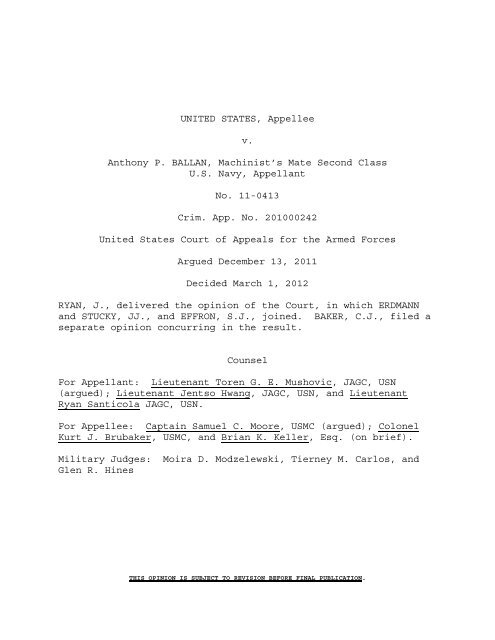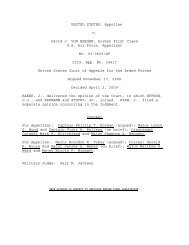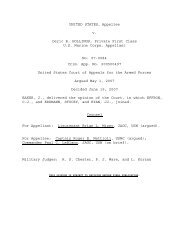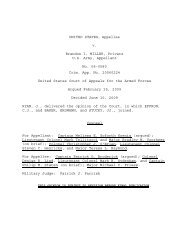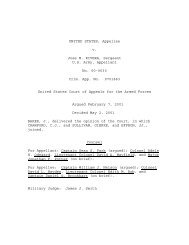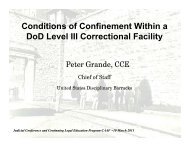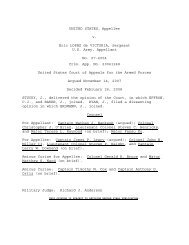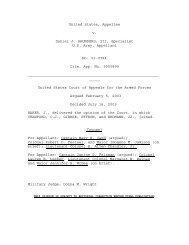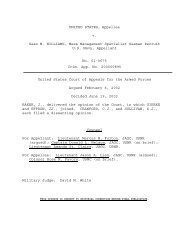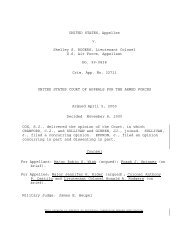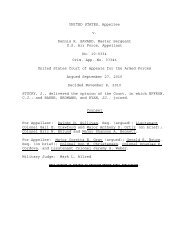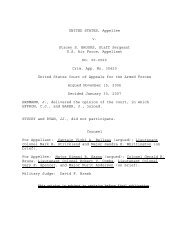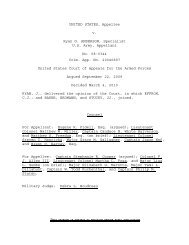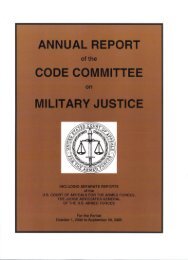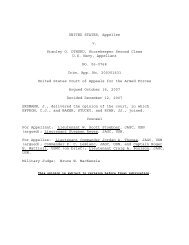U.S.v. Ballan - United States Court of Appeals for the Armed Forces
U.S.v. Ballan - United States Court of Appeals for the Armed Forces
U.S.v. Ballan - United States Court of Appeals for the Armed Forces
Create successful ePaper yourself
Turn your PDF publications into a flip-book with our unique Google optimized e-Paper software.
UNITED STATES, Appellee<br />
v.<br />
Anthony P. BALLAN, Machinist’s Mate Second Class<br />
U.S. Navy, Appellant<br />
No. 11-0413<br />
Crim. App. No. 201000242<br />
<strong>United</strong> <strong>States</strong> <strong>Court</strong> <strong>of</strong> <strong>Appeals</strong> <strong>for</strong> <strong>the</strong> <strong>Armed</strong> <strong>Forces</strong><br />
Argued December 13, 2011<br />
Decided March 1, 2012<br />
RYAN, J., delivered <strong>the</strong> opinion <strong>of</strong> <strong>the</strong> <strong>Court</strong>, in which ERDMANN<br />
and STUCKY, JJ., and EFFRON, S.J., joined. BAKER, C.J., filed a<br />
separate opinion concurring in <strong>the</strong> result.<br />
Counsel<br />
For Appellant: Lieutenant Toren G. E. Mushovic, JAGC, USN<br />
(argued); Lieutenant Jentso Hwang, JAGC, USN, and Lieutenant<br />
Ryan Santicola JAGC, USN.<br />
For Appellee: Captain Samuel C. Moore, USMC (argued); Colonel<br />
Kurt J. Brubaker, USMC, and Brian K. Keller, Esq. (on brief).<br />
Military Judges: Moira D. Modzelewski, Tierney M. Carlos, and<br />
Glen R. Hines<br />
THIS OPINION IS SUBJECT TO REVISION BEFORE FINAL PUBLICATION.
<strong>United</strong> <strong>States</strong> v. <strong>Ballan</strong>, No. 11-0413/NA<br />
Judge RYAN delivered <strong>the</strong> opinion <strong>of</strong> <strong>the</strong> <strong>Court</strong>.<br />
A military judge, sitting as a general court-martial,<br />
convicted Appellant, pursuant to his pleas, <strong>of</strong> one specification<br />
<strong>of</strong> sodomy with a child under age twelve, one specification <strong>of</strong><br />
indecent acts with a child, 1 and eight specifications <strong>of</strong> indecent<br />
acts with ano<strong>the</strong>r, violations <strong>of</strong> Articles 125 and 134, Uni<strong>for</strong>m<br />
Code <strong>of</strong> Military Justice (UCMJ), 10 U.S.C. §§ 925, 934 (2006). 2<br />
A panel <strong>of</strong> members sentenced Appellant to a dishonorable<br />
discharge, confinement <strong>for</strong> a period <strong>of</strong> twenty-five years, and<br />
<strong>for</strong>feiture <strong>of</strong> all pay and allowances.<br />
In accordance with Appellant’s pretrial agreement, <strong>the</strong><br />
convening authority agreed to suspend confinement in excess <strong>of</strong><br />
twenty years <strong>for</strong> <strong>the</strong> period <strong>of</strong> confinement served plus twelve<br />
months.<br />
Addressing an unrelated issue on appeal, <strong>the</strong> <strong>United</strong> <strong>States</strong><br />
Navy-Marine Corps <strong>Court</strong> <strong>of</strong> Criminal <strong>Appeals</strong> (NMCCA) set aside<br />
1 Relevant to Specified Issue II, Appellant was charged with rape<br />
<strong>of</strong> a child, in violation <strong>of</strong> Article 120, UCMJ, 10 U.S.C. § 920<br />
(2006), not indecent acts with a child, a violation, at <strong>the</strong><br />
time, <strong>of</strong> Article 134, UCMJ, see Manual <strong>for</strong> <strong>Court</strong>s-Martial,<br />
<strong>United</strong> <strong>States</strong>, Punitive Articles Applicable to Sexual Assault<br />
Offenses Committed Prior to 1 October 2007 app. 27 at A27-3<br />
(2008 ed.) (MCM).<br />
2 Appellant was properly tried and convicted under <strong>the</strong> pertinent<br />
provisions <strong>of</strong> <strong>the</strong> UCMJ and MCM as in effect prior to <strong>the</strong> October<br />
1, 2007, effective date <strong>of</strong> <strong>the</strong> amendments to <strong>the</strong> UCMJ and MCM<br />
made by <strong>the</strong> National Defense Authorization Act <strong>for</strong> Fiscal Year<br />
2006, Pub. L. No. 109-163, § 552, 119 Stat. 3136, 3256-63<br />
(2006).<br />
2
<strong>United</strong> <strong>States</strong> v. <strong>Ballan</strong>, No. 11-0413/NA<br />
<strong>the</strong> findings <strong>of</strong> guilty and dismissed Specifications 6, 7, and 8<br />
<strong>of</strong> Charge III as legally insufficient. <strong>United</strong> <strong>States</strong> v. <strong>Ballan</strong>,<br />
No. NMCCA 201000242, slip op. at 3, 5 (N-M. Ct. Crim. App. Jan.<br />
27, 2011). The NMCCA reassessed Appellant’s sentence, but found<br />
that <strong>the</strong> members would have never<strong>the</strong>less imposed <strong>the</strong> same<br />
sentence. 3 Id. at 4.<br />
Consistent with our decision in <strong>United</strong> <strong>States</strong> v. Wilkins,<br />
29 M.J. 421 (C.M.A 1990), we hold that action by <strong>the</strong> convening<br />
authority showing an intent to refer a particular charge to<br />
trial is sufficient to satisfy <strong>the</strong> jurisdictional requirements<br />
<strong>of</strong> <strong>the</strong> Rules <strong>for</strong> <strong>Court</strong>s-Martial (R.C.M.). Fur<strong>the</strong>r, we hold that<br />
while it is error to fail to allege <strong>the</strong> terminal element <strong>of</strong><br />
3 Appellant submitted a petition <strong>for</strong> a grant <strong>of</strong> review with no<br />
assignment <strong>of</strong> error, and, on June 2, 2011, this <strong>Court</strong> specified<br />
<strong>the</strong> following two issues:<br />
I. WHETHER AN ARTICLE 134 CLAUSE 1 OR 2 SPECIFICATION THAT<br />
FAILS TO EXPRESSLY ALLEGE EITHER POTENTIAL TERMINAL ELEMENT<br />
STATES AN OFFENSE UNDER THE SUPREME COURT’S HOLDINGS IN<br />
UNITED STATES v. RESENDIZ-PONCE AND RUSSELL v. UNITED<br />
STATES, AND THIS COURT’S RECENT OPINIONS IN MEDINA, MILLER,<br />
AND JONES.<br />
II. ALTHOUGH THE CRIME OF INDECENT ACTS WITH A CHILD TO<br />
WHICH APPELLANT PLEADED GUILTY WAS NOT A LESSER INCLUDED<br />
OFFENSE OF THE CHARGED CRIME OF RAPE OF A CHILD AND THUS<br />
HAD NOT BEEN FORMALLY REFERRED TO TRIAL BY COURT-MARTIAL BY<br />
THE CONVENING AUTHORITY, WHETHER APPELLANT WAIVED SUCH<br />
IRREGULARITY BY PLEADING GUILTY UNDER A PRETRIAL AGREEMENT<br />
TO INDECENT ACTS WITH A CHILD IN VIOLATION OF ARTICLE 134,<br />
WHERE NEITHER THE PRETRIAL AGREEMENT NOR APPELLANT’S PLEA<br />
AT ARRAIGNMENT EXPRESSLY SET FORTH EITHER POTENTIAL<br />
TERMINAL ELEMENT FOR AN ARTICLE 134 CLAUSE 1 OR 2<br />
SPECIFICATION, BUT BOTH ELEMENTS WERE DISCUSSED AND<br />
ADMITTED DURING THE PROVIDENCE INQUIRY.<br />
3
<strong>United</strong> <strong>States</strong> v. <strong>Ballan</strong>, No. 11-0413/NA<br />
Article 134, UCMJ, expressly or by necessary implication, in <strong>the</strong><br />
context <strong>of</strong> a guilty plea, where <strong>the</strong> error is alleged <strong>for</strong> <strong>the</strong><br />
first time on appeal, whe<strong>the</strong>r <strong>the</strong>re is a remedy <strong>for</strong> <strong>the</strong> error<br />
will depend on whe<strong>the</strong>r <strong>the</strong> error has prejudiced <strong>the</strong> substantial<br />
rights <strong>of</strong> <strong>the</strong> accused. See Article 59, UCMJ, 10 U.S.C. § 859<br />
(2006).<br />
I. FACTUAL BACKGROUND<br />
The Naval Criminal Investigative Service (NCIS) began<br />
investigating Appellant in 2008 when his three biological<br />
children -- all living separately in foster homes at <strong>the</strong> time --<br />
were observed exhibiting age-inappropriate sexual behavior.<br />
Pursuant to this investigation, NCIS interviewed Appellant on<br />
July 9, 2008. During this and a subsequent interview, Appellant<br />
admitted that he had engaged in a variety <strong>of</strong> sexual misconduct<br />
with, and in <strong>the</strong> presence <strong>of</strong>, his children -- all <strong>of</strong> whom were<br />
under age twelve at <strong>the</strong> time <strong>of</strong> <strong>the</strong> events. The exact nature <strong>of</strong><br />
<strong>the</strong> conduct is not relevant to ei<strong>the</strong>r <strong>of</strong> <strong>the</strong> specified issues<br />
now under consideration.<br />
On April 22, 2009, <strong>the</strong> Government preferred <strong>the</strong> following<br />
charges against Appellant: one specification <strong>of</strong> rape <strong>of</strong> a<br />
child, in violation <strong>of</strong> Article 120, UCMJ, one specification <strong>of</strong><br />
sodomy with a child under age twelve, in violation <strong>of</strong> Article<br />
125, UCMJ, and eight specifications <strong>of</strong> indecent acts or<br />
liberties with a child, in violation <strong>of</strong> Article 134, UCMJ. As<br />
4
<strong>United</strong> <strong>States</strong> v. <strong>Ballan</strong>, No. 11-0413/NA<br />
preferred, none <strong>of</strong> <strong>the</strong> specifications <strong>of</strong> indecent acts or<br />
liberties with a child contained <strong>the</strong> terminal element <strong>for</strong><br />
Article 134, UCMJ.<br />
On June 5, 2009, Appellant and his defense counsel signed a<br />
valid unconditional waiver <strong>of</strong> investigation under Article 32,<br />
UCMJ, 10 U.S.C. § 832 (2006). A month later, on July 6, 2009,<br />
Appellant and his defense counsel signed a two-part Memorandum<br />
<strong>of</strong> Pretrial Agreement. With regard to Charge I -- alleging a<br />
single specification <strong>of</strong> rape <strong>of</strong> a child, in violation <strong>of</strong> Article<br />
120, UCMJ -- Appellant agreed to plead “NOT GUILTY [to <strong>the</strong><br />
Article 120, UCMJ, violation], but GUILTY to <strong>the</strong> LIO [Lesser<br />
Included Offense] <strong>of</strong> indecent acts with a child,” in violation<br />
<strong>of</strong> Article 134, UCMJ. Nei<strong>the</strong>r <strong>the</strong> original Charge I<br />
specification nor <strong>the</strong> specification to which Appellant agreed to<br />
plead guilty included <strong>the</strong> terminal element <strong>for</strong> Article 134,<br />
UCMJ. Appellant also agreed to plead guilty to <strong>the</strong> Article 125,<br />
UCMJ, violation essentially as charged and, <strong>for</strong> <strong>the</strong> eight<br />
specifications <strong>of</strong> indecent acts with a child in Charge III, to<br />
<strong>the</strong> lesser included <strong>of</strong>fense (LIO) <strong>of</strong> indecent acts with ano<strong>the</strong>r,<br />
both violations <strong>of</strong> Article 134, UCMJ. The Charge III<br />
specifications in <strong>the</strong> pretrial agreement again failed to allege<br />
<strong>the</strong> terminal element <strong>for</strong> Article 134, UCMJ.<br />
On July 10, 2009, <strong>the</strong> Staff Judge Advocate (SJA) sent <strong>the</strong><br />
convening authority a memorandum regarding <strong>the</strong> charges pending<br />
5
<strong>United</strong> <strong>States</strong> v. <strong>Ballan</strong>, No. 11-0413/NA<br />
against Appellant and attached, inter alia, <strong>the</strong> original charge<br />
sheet and Appellant’s signed Memorandum <strong>of</strong> Pretrial Agreement.<br />
In this memorandum, <strong>the</strong> SJA first noted that Appellant had<br />
agreed “to plead guilty to 1 specification <strong>of</strong> Article 125, UCMJ,<br />
and 9 specifications <strong>of</strong> Article 134, UCMJ” and <strong>the</strong>n recommended<br />
that <strong>the</strong> convening authority “refer <strong>the</strong> charges and<br />
specifications to general court-martial.” That same day, <strong>the</strong><br />
convening authority referred <strong>the</strong> charges originally preferred<br />
against Appellant to <strong>the</strong> court-martial that he had ordered to be<br />
convened on March 18, 2009, and approved both parts <strong>of</strong> <strong>the</strong><br />
pretrial agreement.<br />
Prior to <strong>the</strong> court-martial, <strong>the</strong> parties submitted a<br />
stipulation <strong>of</strong> fact, which described <strong>the</strong> elements and underlying<br />
facts <strong>of</strong> each charge and specification. The stipulation’s<br />
explanation <strong>of</strong> <strong>the</strong> <strong>of</strong>fenses to which Appellant was pleading<br />
guilty included an acknowledgement that his conduct was<br />
prejudicial to good order and discipline and <strong>of</strong> a nature to<br />
bring discredit upon <strong>the</strong> armed <strong>for</strong>ces. During Appellant’s plea<br />
inquiry, <strong>the</strong> military judge explained each <strong>of</strong> <strong>the</strong> elements,<br />
including <strong>the</strong> terminal element, <strong>of</strong> <strong>the</strong> Charge I specification <strong>of</strong><br />
indecent acts with a child, in violation <strong>of</strong> Article 134, UCMJ.<br />
The military judge verified that “<strong>the</strong>se elements correctly<br />
describe[d]” Appellant’s conduct, and Appellant described <strong>the</strong><br />
conduct in his own words. The military judge <strong>the</strong>n asked<br />
6
<strong>United</strong> <strong>States</strong> v. <strong>Ballan</strong>, No. 11-0413/NA<br />
Appellant, “[W]ere <strong>the</strong>se acts prejudicial to good order and<br />
discipline or service discrediting, or both in your opinion?”<br />
Appellant responded that <strong>the</strong>y were “[s]ervice discrediting,” and<br />
explained why he believed this to be true.<br />
The military judge repeated <strong>the</strong> same plea inquiry <strong>for</strong> each<br />
<strong>of</strong> <strong>the</strong> eight Article 134, UCMJ, specifications in Charge III:<br />
<strong>the</strong> military judge explained <strong>the</strong> elements, had Appellant<br />
describe <strong>the</strong> underlying conduct, and <strong>the</strong>n asked Appellant<br />
whe<strong>the</strong>r -- and if so, how -- his actions were service<br />
discrediting or prejudicial to good order and discipline. For<br />
each <strong>of</strong> <strong>the</strong> eight specifications, Appellant explained how his<br />
conduct was service discrediting.<br />
II. ISSUE II: THE CHARGED ARTICLE 120, UCMJ, OFFENSE<br />
“We review jurisdictional questions de novo.” <strong>United</strong><br />
<strong>States</strong> v. Alexander, 61 M.J. 266, 269 (C.A.A.F. 2005). “A<br />
jurisdictional defect goes to <strong>the</strong> underlying authority <strong>of</strong> a<br />
court to hear a case . . . [h]owever, where an error is<br />
procedural ra<strong>the</strong>r than jurisdictional in nature we test <strong>for</strong><br />
material prejudice to a substantial right to determine whe<strong>the</strong>r<br />
relief is warranted.” Id. (citing Article 59(a), UCMJ; <strong>United</strong><br />
<strong>States</strong> v. Morgan, 57 M.J. 119, 122 (C.A.A.F. 2002)).<br />
Appellant alleges that <strong>the</strong> court-martial lacked<br />
jurisdiction over <strong>the</strong> Charge I, Article 134, UCMJ, indecent acts<br />
with a child <strong>of</strong>fense to which he pleaded guilty because this<br />
7
<strong>United</strong> <strong>States</strong> v. <strong>Ballan</strong>, No. 11-0413/NA<br />
<strong>of</strong>fense is not in fact an LIO <strong>of</strong> <strong>the</strong> Article 120, UCMJ, <strong>of</strong>fense<br />
that was referred to court-martial by <strong>the</strong> convening authority.<br />
Under R.C.M. 201(b)(3), “[e]ach charge be<strong>for</strong>e <strong>the</strong> court-martial<br />
must be referred to it by competent authority.” R.C.M. 601(a)<br />
defines referral as “<strong>the</strong> order <strong>of</strong> a convening authority that<br />
charges against an accused will be tried by a specified court-<br />
martial.”<br />
That indecent acts with a child is not an LIO <strong>of</strong> rape <strong>of</strong> a<br />
child is easily determined by reference to settled case law,<br />
given that <strong>the</strong> <strong>of</strong>fenses at issue are <strong>the</strong> same ones discussed in<br />
<strong>United</strong> <strong>States</strong> v. Jones -- albeit with a child victim ra<strong>the</strong>r than<br />
an adult. 68 M.J. 465, 473 (C.A.A.F. 2010) (applying <strong>the</strong><br />
elements test and holding that “<strong>the</strong> elements <strong>of</strong> rape do not<br />
include all (or indeed any) <strong>of</strong> <strong>the</strong> elements <strong>of</strong> indecent acts”).<br />
We disagree, however, that <strong>the</strong> Article 134, UCMJ, indecent acts<br />
with a child <strong>of</strong>fense to which Appellant pleaded guilty was not<br />
itself referred to <strong>the</strong> court-martial, in which case its status<br />
as an LIO <strong>for</strong> purposes <strong>of</strong> referral has no bearing on<br />
jurisdiction over that <strong>of</strong>fense in this case.<br />
The law is well settled that “[a]lthough <strong>the</strong> [referral]<br />
order is a jurisdictional prerequisite, <strong>the</strong> <strong>for</strong>m <strong>of</strong> <strong>the</strong> order is<br />
not jurisdictional.” Wilkins, 29 M.J. at 424. Here, as in<br />
Wilkins, <strong>the</strong> convening authority referred one <strong>of</strong>fense to court-<br />
martial on <strong>the</strong> charge sheet, but entered into a pretrial<br />
8
<strong>United</strong> <strong>States</strong> v. <strong>Ballan</strong>, No. 11-0413/NA<br />
agreement whereby he agreed to accept a plea <strong>of</strong> guilty from<br />
Appellant to a different charge that was also not an LIO <strong>of</strong> <strong>the</strong><br />
original charge. See id. at 422. The holding in Wilkins as to<br />
whe<strong>the</strong>r a court-martial has jurisdiction over <strong>the</strong> latter <strong>of</strong>fense<br />
is directly on point here: “[i]mplicit” in <strong>the</strong> convening<br />
authority’s entry into a pretrial agreement that provided <strong>for</strong> a<br />
plea <strong>of</strong> guilty to <strong>the</strong> charge and specification <strong>of</strong> indecent acts<br />
with ano<strong>the</strong>r, in violation <strong>of</strong> Article 134, UCMJ, “was his<br />
personal decision that <strong>the</strong> . . . charge be referred to <strong>the</strong><br />
general court-martial . . . .” See id. at 424. We held in<br />
Wilkins, and reiterate today, that <strong>the</strong> convening authority’s<br />
entry into <strong>the</strong> pretrial agreement was <strong>the</strong> “functional<br />
equivalent” <strong>of</strong> a referral order and that it satisfied R.C.M.<br />
201(b)(3). See id.<br />
Changing <strong>the</strong> charge from a violation <strong>of</strong> Article 120, UCMJ,<br />
to a violation <strong>of</strong> Article 134, UCMJ, was, admittedly, a major<br />
change. See R.C.M. 603(a). And R.C.M. 603(d) provides that<br />
major “[c]hanges or amendments to charges or<br />
specifications . . . may not be made over <strong>the</strong> objection <strong>of</strong> <strong>the</strong><br />
accused unless <strong>the</strong> charge or specification affected is preferred<br />
anew.” Here, however, Appellant not only did not object to <strong>the</strong><br />
change, he proposed <strong>the</strong> change in his pretrial agreement,<br />
explained to <strong>the</strong> military judge why he was guilty be<strong>for</strong>e <strong>the</strong><br />
plea was accepted, and benefited from <strong>the</strong> amendment. There<strong>for</strong>e,<br />
9
<strong>United</strong> <strong>States</strong> v. <strong>Ballan</strong>, No. 11-0413/NA<br />
as in Wilkins, we consider Appellant’s actions as agreeing to an<br />
amendment to <strong>the</strong> charge and specification, even though <strong>the</strong><br />
charge sheet itself was not physically amended. See 29 M.J. at<br />
424 (noting that an appellant can waive both <strong>the</strong> SJA opinion<br />
required by Article 34, UCMJ, 10 U.S.C. § 834 (2006), and <strong>the</strong><br />
“swearing to <strong>the</strong> charges against him, as long as it was clear<br />
what charges were to be considered by <strong>the</strong> court-martial” (citing<br />
R.C.M. 603(d))); see also <strong>United</strong> <strong>States</strong> v. Morton, 69 M.J. 12,<br />
16 (C.A.A.F. 2010); Jones, 68 M.J. at 473.<br />
We conclude that Appellant pleaded guilty to a charge and<br />
specification <strong>of</strong> indecent acts with a child, which, by virtue <strong>of</strong><br />
his pretrial agreement, was referred to court-martial and which<br />
he agreed to have considered by <strong>the</strong> court-martial. And yet,<br />
even as referred in <strong>the</strong> pretrial agreement, <strong>the</strong> specification<br />
did not allege <strong>the</strong> terminal element <strong>of</strong> <strong>the</strong> Article 134, UCMJ,<br />
<strong>of</strong>fense. Since it shares this deficiency with <strong>the</strong> o<strong>the</strong>r Article<br />
134, UCMJ, <strong>of</strong>fenses in this case, that issue will be treated in<br />
<strong>the</strong> next section.<br />
III. ISSUE I: THE ARTICLE 134, UCMJ, OFFENSES<br />
Whe<strong>the</strong>r a specification is defective and <strong>the</strong> remedy <strong>for</strong><br />
such error are questions <strong>of</strong> law, which we review de novo. See<br />
<strong>United</strong> <strong>States</strong> v. Crafter, 64 M.J. 209, 211 (C.A.A.F. 2006); see<br />
also <strong>United</strong> <strong>States</strong> v. Girouard, 70 M.J. 5, 10 (C.A.A.F. 2011)<br />
10
<strong>United</strong> <strong>States</strong> v. <strong>Ballan</strong>, No. 11-0413/NA<br />
(determining <strong>the</strong> appropriate remedial standard by means <strong>of</strong> a de<br />
novo review <strong>of</strong> <strong>the</strong> rights at stake).<br />
A. Defective Article 134, UCMJ, Specifications<br />
In <strong>United</strong> <strong>States</strong> v. Fosler, we provided a synopsis <strong>of</strong> this<br />
<strong>Court</strong>’s jurisprudence on sufficiency <strong>of</strong> indictments and <strong>the</strong><br />
doctrine <strong>of</strong> LIOs. 70 M.J. 225, 229-34 (C.A.A.F. 2011). We held<br />
that, in a contested case, <strong>the</strong> terminal element <strong>of</strong> Article 134,<br />
UCMJ, could not be implied from language in a specification<br />
alleging that <strong>the</strong> appellant had “wrongfully” committed adultery<br />
in violation <strong>of</strong> Article 134, UCMJ. Id. at 234. In coming to<br />
this conclusion, we rejected <strong>the</strong> argument that <strong>the</strong> Supreme<br />
<strong>Court</strong>’s decision in Parker v. Levy, 417 U.S. 733 (1974)<br />
(upholding <strong>the</strong> constitutionality <strong>of</strong> Article 134, UCMJ, in part<br />
on <strong>the</strong> basis <strong>of</strong> its unique history in <strong>the</strong> military), allowed <strong>the</strong><br />
<strong>Court</strong> to imply <strong>the</strong> terminal element where it had not been<br />
alleged. Fosler, 70 M.J. at 232. Reviewing “<strong>the</strong> charge and<br />
specification more narrowly than we might at later stages,” we<br />
determined that <strong>the</strong> phrase “Article 134” did not allege <strong>the</strong><br />
terminal element expressly or by necessary implication. Id.<br />
This decision is consonant with <strong>United</strong> <strong>States</strong> v. Miller, 67 M.J.<br />
385 (C.A.A.F. 2009), which rejected both <strong>the</strong> doctrine <strong>of</strong><br />
“implied elements,” and <strong>the</strong> corollary notion that <strong>the</strong> terminal<br />
element <strong>of</strong> “prejudicial to good order and discipline” or service<br />
11
<strong>United</strong> <strong>States</strong> v. <strong>Ballan</strong>, No. 11-0413/NA<br />
discrediting was “inherent” in every enumerated <strong>of</strong>fense. See<br />
id. at 388-89.<br />
Thus, whe<strong>the</strong>r specifications <strong>for</strong> charged violations <strong>of</strong><br />
Article 134, UCMJ, may be upheld in <strong>the</strong> guilty plea context<br />
where <strong>the</strong> terminal element is not alleged cannot be answered by<br />
determining that <strong>the</strong> act that an accused “did or failed to do,”<br />
MCM pt. IV, para. 60.b.(1), is inherently, impliedly, or as a<br />
matter <strong>of</strong> common sense, prejudicial to good order and discipline<br />
or service discrediting. See Jones, 68 M.J. at 471 (overruling<br />
prior precedent, which allowed <strong>the</strong> terminal element <strong>of</strong> Article<br />
134, UCMJ, to be implied from <strong>the</strong> <strong>of</strong>fense charged); Miller, 67<br />
M.J. at 389 (overruling prior precedent, which held “that<br />
clauses 1 and 2 <strong>of</strong> Article 134, UCMJ, are per se included in<br />
every enumerated <strong>of</strong>fense”).<br />
While in <strong>the</strong> case <strong>of</strong> a guilty plea where <strong>the</strong> appellant<br />
raises <strong>the</strong> validity <strong>of</strong> a specification <strong>for</strong> <strong>the</strong> first time on<br />
appeal, <strong>the</strong> <strong>Court</strong> “view[s] [<strong>the</strong>] specification[] with maximum<br />
liberality,” <strong>United</strong> <strong>States</strong> v. Bryant, 30 M.J. 72, 73 (C.M.A.<br />
1990); see also <strong>United</strong> <strong>States</strong> v. Watkins, 21 M.J. 208, 209<br />
(C.M.A. 1986), such construction still does not permit us to<br />
“necessarily imply” a separate and distinct element from nothing<br />
beyond allegations <strong>of</strong> <strong>the</strong> act or failure to act itself. We<br />
emphasize yet again that <strong>the</strong> terminal element, which may be<br />
charged in three different ways, is an actual and distinct<br />
12
<strong>United</strong> <strong>States</strong> v. <strong>Ballan</strong>, No. 11-0413/NA<br />
element <strong>of</strong> an Article 134, UCMJ, <strong>of</strong>fense. See, e.g., Fosler, 70<br />
M.J. at 228-30; <strong>United</strong> <strong>States</strong> v. Medina, 66 M.J. 21, 24-26<br />
(C.A.A.F. 2008). As such, <strong>the</strong> terminal element <strong>of</strong> Article 134,<br />
UCMJ, like any element <strong>of</strong> any criminal <strong>of</strong>fense, must be<br />
separately charged and proven. See, e.g., Jones v. <strong>United</strong><br />
<strong>States</strong>, 526 U.S. 227, 232 (1999) (noting that any fact that is<br />
an element <strong>of</strong> an <strong>of</strong>fense “must be charged in <strong>the</strong> indictment,<br />
submitted to a jury, and proven by <strong>the</strong> Government beyond a<br />
reasonable doubt”); Schmuck v. <strong>United</strong> <strong>States</strong>, 489 U.S. 705, 718<br />
(1989); see also <strong>United</strong> <strong>States</strong> v. Denmon, 483 F.2d 1093, 1096<br />
(8th Cir. 1973) (“heartily applaud[ing] <strong>the</strong> salutory trend in<br />
recent years to simplify <strong>the</strong> indictment,” but noting that it<br />
“cannot go so far in economy <strong>of</strong> words as to approve <strong>the</strong> omission<br />
in an indictment <strong>of</strong> essential elements <strong>of</strong> an <strong>of</strong>fense”).<br />
Consequently, a violation <strong>of</strong> any <strong>of</strong> <strong>the</strong> three clauses <strong>of</strong> Article<br />
134, UCMJ, “does not necessarily lead to a violation <strong>of</strong> <strong>the</strong><br />
o<strong>the</strong>r clauses,” Fosler, 70 M.J. at 230, and <strong>the</strong> principle <strong>of</strong><br />
fair notice requires that an accused know to which clause he is<br />
pleading guilty, Medina, 66 M.J. at 26, and against which clause<br />
or clauses he must defend, Fosler, 70 M.J. at 230. We <strong>the</strong>re<strong>for</strong>e<br />
hold that regardless <strong>of</strong> context, it is error to fail to allege<br />
<strong>the</strong> terminal element <strong>of</strong> Article 134, UCMJ, expressly or by<br />
necessary implication.<br />
13
<strong>United</strong> <strong>States</strong> v. <strong>Ballan</strong>, No. 11-0413/NA<br />
B. Plain Error Review and Remedies<br />
As charged in this case, none <strong>of</strong> <strong>the</strong> specifications<br />
alleging violations <strong>of</strong> Article 134, UCMJ, to which Appellant<br />
pleaded guilty, alleged clause 1 or 2 <strong>of</strong> <strong>the</strong> terminal element <strong>of</strong><br />
Article 134, UCMJ, which is error. 4 See R.C.M. 307(c)(3). Error<br />
alone does not, however, warrant dismissal. While <strong>the</strong> rules<br />
state that a charge or specification that fails to state an<br />
<strong>of</strong>fense should be dismissed, R.C.M. 907(b)(1), a charge that is<br />
defective because it fails to allege an element <strong>of</strong> an <strong>of</strong>fense,<br />
if not raised at trial, is tested <strong>for</strong> plain error. 5 See, e.g.,<br />
4 The Article 134, UCMJ, specifications in this case were legally<br />
sufficient at <strong>the</strong> time <strong>of</strong> trial and are problematic today only<br />
because <strong>of</strong> intervening changes in <strong>the</strong> law. See, e.g., <strong>United</strong><br />
<strong>States</strong> v. Mayo, 12 M.J. 286, 293-94 (C.M.A. 1982) (holding that<br />
<strong>the</strong> clause 1 terminal element <strong>of</strong> Article 134, UCMJ, need not be<br />
alleged in <strong>the</strong> specification), overruled by Fosler, 70 M.J. at<br />
232.<br />
5 The Committee on Rules <strong>of</strong> Practice and Procedure is currently<br />
seeking comments on <strong>the</strong> Preliminary Draft <strong>of</strong> Proposed Amendments<br />
to <strong>the</strong> Federal Rules <strong>of</strong> Criminal Procedure, which seeks to<br />
clarify “which motions must be raised be<strong>for</strong>e trial,” and<br />
addresses <strong>the</strong> “consequences <strong>of</strong> an untimely motion.” The<br />
proposed rule, in relevant part, states:<br />
If a party does not meet <strong>the</strong> deadline . . . <strong>for</strong> making<br />
a Rule 12(b)(3) motion, <strong>the</strong> motion is untimely. In<br />
such a case, Rule 52 does not apply, but a court may<br />
consider <strong>the</strong> defense, objection, or request if:<br />
(A) <strong>the</strong> party shows cause and prejudice; or<br />
(B) <strong>the</strong> defense or objection is failure to state an<br />
<strong>of</strong>fense or double jeopardy, and <strong>the</strong> party shows<br />
prejudice only.<br />
Memorandum from <strong>the</strong> Advisory Comm. on Fed. Rules <strong>of</strong> Crim.<br />
Procedure to <strong>the</strong> Standing Comm. on Rules <strong>of</strong> Practice and<br />
14
<strong>United</strong> <strong>States</strong> v. <strong>Ballan</strong>, No. 11-0413/NA<br />
<strong>United</strong> <strong>States</strong> v. Cotton, 535 U.S. 625, 631-32 (2002) (rejecting<br />
precedent that defects in <strong>the</strong> indictment are jurisdictional and<br />
applying plain error review); <strong>United</strong> <strong>States</strong> v. Sinks, 473 F.3d<br />
1315, 1320-21 (10th Cir. 2007) (affirming that failure to allege<br />
an element <strong>of</strong> a crime does not affect a court’s subject matter<br />
jurisdiction, but stating that plain not harmless error review<br />
applies). In Fosler -- a contested case where <strong>the</strong> appellant<br />
objected -- we dismissed <strong>the</strong> charge. 70 M.J. at 226. In<br />
Girouard -- a contested case with no objection where <strong>the</strong><br />
specification <strong>of</strong> which <strong>the</strong> appellant was convicted was not an<br />
LIO <strong>of</strong> <strong>the</strong> charged <strong>of</strong>fense and did not allege all <strong>of</strong> <strong>the</strong><br />
elements -- we applied plain error review and tested <strong>for</strong><br />
prejudice. 6 70 M.J. at 11-12. However, nei<strong>the</strong>r <strong>of</strong> those cases<br />
involved a guilty plea, and thus <strong>the</strong>y did not address prejudice<br />
or <strong>the</strong> ramifications <strong>of</strong> a guilty plea in <strong>the</strong> unique context <strong>of</strong><br />
<strong>the</strong> military justice system.<br />
C. Prejudice and <strong>the</strong> Plea Inquiry<br />
In our view, in <strong>the</strong> context <strong>of</strong> a specification that was<br />
legally sufficient at <strong>the</strong> time <strong>of</strong> trial and to which a plea <strong>of</strong><br />
Procedure (May 12, 2011), http://www.uscourts.gov/<br />
uscourts/RulesAndPolicies/rules/Publication%20Aug%202011/CR<br />
_May_2011.pdf.<br />
6 “In <strong>the</strong> context <strong>of</strong> a plain error analysis, Appellant has <strong>the</strong><br />
burden <strong>of</strong> demonstrating: (1) <strong>the</strong>re was error; (2) <strong>the</strong> error was<br />
plain or obvious; and (3) <strong>the</strong> error materially prejudiced a<br />
substantial right <strong>of</strong> <strong>the</strong> accused.” Girouard, 70 M.J. at 11.<br />
15
<strong>United</strong> <strong>States</strong> v. <strong>Ballan</strong>, No. 11-0413/NA<br />
guilty was entered and accepted, <strong>the</strong> real question is whe<strong>the</strong>r we<br />
will find prejudice and disturb <strong>the</strong> providence <strong>of</strong> a plea where<br />
<strong>the</strong> providence inquiry clearly delineates each element <strong>of</strong> <strong>the</strong><br />
<strong>of</strong>fense and shows that <strong>the</strong> appellant understood “to what <strong>of</strong>fense<br />
and under what legal <strong>the</strong>ory [he was] pleading guilty,” Medina,<br />
66 M.J. at 26. 7 We answer this question in <strong>the</strong> negative.<br />
“[A] counseled plea <strong>of</strong> guilty is an admission <strong>of</strong> factual<br />
guilt so reliable that, where voluntary and intelligent, it<br />
quite validly removes <strong>the</strong> issue <strong>of</strong> factual guilt from <strong>the</strong> case.”<br />
Menna v. New York, 423 U.S. 61, 62 n.2 (1975). None<strong>the</strong>less, a<br />
military judge may not accept a plea <strong>of</strong> guilty until “<strong>the</strong><br />
elements <strong>of</strong> each <strong>of</strong>fense charged [have] been explained to <strong>the</strong><br />
accused” and unless <strong>the</strong> military judge has questioned <strong>the</strong><br />
accused to ensure that he understands and agrees that “<strong>the</strong> acts<br />
or <strong>the</strong> omissions . . . constitute <strong>the</strong> <strong>of</strong>fense or <strong>of</strong>fenses to<br />
which he is pleading guilty.” <strong>United</strong> <strong>States</strong> v. Care, 18 C.M.A.<br />
535, 541, 40 C.M.R. 247, 253 (1969); see also R.C.M. 910(d)-(h).<br />
The guilty plea process within <strong>the</strong> military justice system<br />
thus ensures that an appellant has notice <strong>of</strong> <strong>the</strong> <strong>of</strong>fense <strong>of</strong><br />
7 The notice problem highlighted in Fosler, where <strong>the</strong> appellant<br />
could not know which <strong>the</strong>ory <strong>of</strong> criminality he needed to defend<br />
against, and in Medina, where <strong>the</strong> appellant’s providence inquiry<br />
failed to in<strong>for</strong>m him that nothing in <strong>the</strong> charged specification,<br />
which alleged a violation <strong>of</strong> a federal statute, required him to<br />
admit guilt to clause 2 or Article 134, UCMJ, which was not<br />
alleged, are not present in this case. See Fosler, 70 M.J. at<br />
230; Medina, 66 M.J at 26.<br />
16
<strong>United</strong> <strong>States</strong> v. <strong>Ballan</strong>, No. 11-0413/NA<br />
which he may be convicted and all elements <strong>the</strong>re<strong>of</strong> be<strong>for</strong>e his<br />
plea is accepted and, moreover, protects him against double<br />
jeopardy. 8 See Russell v. <strong>United</strong> <strong>States</strong>, 369 U.S. 749, 763<br />
(1962); see also <strong>United</strong> <strong>States</strong> v. Resendiz-Ponce, 549 U.S. 102,<br />
108 (2007) (citing Hamling v. <strong>United</strong> <strong>States</strong>, 418 U.S. 87, 117<br />
(1974)). This is illustrated by <strong>the</strong> providence inquiry in <strong>the</strong><br />
present case.<br />
During <strong>the</strong> plea colloquy, <strong>the</strong> military judge described<br />
clauses 1 and 2 <strong>of</strong> <strong>the</strong> terminal element <strong>of</strong> Article 134, UCMJ,<br />
<strong>for</strong> each specification. And <strong>the</strong> record “conspicuously<br />
reflect[s] that <strong>the</strong> accused ‘clearly understood <strong>the</strong> nature <strong>of</strong><br />
<strong>the</strong> prohibited conduct’ as being in violation <strong>of</strong> clause 1 [or]<br />
clause 2, Article 134 . . . .” Medina, 66 M.J. at 28 (quoting<br />
<strong>United</strong> <strong>States</strong> v. Martinelli, 62 M.J. 52, 67 (C.A.A.F. 2005)),<br />
and comparing it to <strong>United</strong> <strong>States</strong> v. Mason, 60 M.J. 15, 19<br />
(C.A.A.F. 2004)); see also R.C.M. 910(c)(1) Discussion. We have<br />
no doubt that Appellant understood both what he was being<br />
charged with and why his conduct was prohibited.<br />
8 And it is both notice as to <strong>the</strong> <strong>of</strong>fense and an affirmative<br />
agreement to be convicted <strong>of</strong> <strong>the</strong> charge, which distinguishes a<br />
defective specification in <strong>the</strong> guilty plea context from a<br />
defective specification or conviction <strong>of</strong> an uncharged <strong>of</strong>fense in<br />
a contested case. See Girouard, 70 M.J. at 10 (discussing <strong>the</strong><br />
Fifth Amendment right to “due process <strong>of</strong> law” and <strong>the</strong> Sixth<br />
Amendment right to “be in<strong>for</strong>med <strong>of</strong> <strong>the</strong> nature and cause <strong>of</strong> <strong>the</strong><br />
accusation”) (quotation marks omitted). None<strong>the</strong>less, absent<br />
objection, in ei<strong>the</strong>r context <strong>the</strong> error is tested <strong>for</strong> prejudice.<br />
See Cotton, 535 U.S. at 631-32; Girouard, 70 M.J. at 11-12.<br />
17
<strong>United</strong> <strong>States</strong> v. <strong>Ballan</strong>, No. 11-0413/NA<br />
After this, in order to have <strong>the</strong> military judge accept his<br />
pleas <strong>of</strong> guilty to <strong>the</strong> Article 134, UCMJ, specifications,<br />
Appellant was required to admit that his actions violated ei<strong>the</strong>r<br />
clause 1 or 2 <strong>of</strong> <strong>the</strong> terminal element <strong>of</strong> that <strong>of</strong>fense, and he<br />
did in fact admit that his actions were service discrediting.<br />
While this same service discrediting admission in Medina was<br />
superfluous, 66 M.J. at 28, Appellant’s admissions that his acts<br />
were service discrediting were necessary in order <strong>for</strong> <strong>the</strong><br />
military judge to accept Appellant’s guilty pleas. See Care, 18<br />
C.M.A. at 541, 40 C.M.R. at 253. As such, Appellant, unlike <strong>the</strong><br />
appellant in Medina, “kn[ew] under what clause he [was] pleading<br />
guilty” and “clearly understood <strong>the</strong> nature <strong>of</strong> <strong>the</strong> prohibited<br />
conduct as being in violation <strong>of</strong> . . . clause 2, Article<br />
134 . . . .” See 66 M.J. at 28 (quoting Martinelli, 62 M.J. at<br />
67) (quotation marks omitted).<br />
There was no prejudice to <strong>the</strong> substantial rights <strong>of</strong><br />
Appellant; this case, involving a defective specification and a<br />
proper plea inquiry, is distinguishable from a contested case<br />
involving a defective specification. In cases like this one,<br />
any notice issues or potential <strong>for</strong> prejudice are cured while<br />
<strong>the</strong>re is still ample opportunity ei<strong>the</strong>r <strong>for</strong> a change in tactics<br />
or <strong>for</strong> <strong>the</strong> accused to withdraw from <strong>the</strong> plea completely -- not<br />
to mention that <strong>the</strong> military judge must, sua sponte, enter a not<br />
guilty plea to <strong>the</strong> affected charge and specification where he<br />
18
<strong>United</strong> <strong>States</strong> v. <strong>Ballan</strong>, No. 11-0413/NA<br />
has found a plea improvident. See R.C.M. 910(h)(1) (allowing an<br />
accused to withdraw a plea <strong>of</strong> guilty); R.C.M. 910(h)(2)<br />
(requiring <strong>the</strong> military judge to enter a plea <strong>of</strong> not guilty when<br />
<strong>the</strong> accused makes statements inconsistent with a guilty plea).<br />
In a contested case, on <strong>the</strong> o<strong>the</strong>r hand, <strong>the</strong>re is no equivalent,<br />
timely cure that would necessarily be present in every properly<br />
conducted court-martial. 9<br />
In sum, while it was error in a retroactive sense to accept<br />
a plea <strong>of</strong> guilty to an Article 134, UCMJ, charge and<br />
specification, which did not explicitly or by necessary<br />
implication contain <strong>the</strong> terminal element, under <strong>the</strong> facts <strong>of</strong><br />
this case, <strong>the</strong> showing <strong>of</strong> error alone is insufficient to show<br />
prejudice to a substantial right. See <strong>United</strong> <strong>States</strong> v. Puckett,<br />
556 U.S. 129, 142 (2009) (finding that <strong>the</strong> mere showing <strong>of</strong> error<br />
cannot be “recast[]” as <strong>the</strong> effect on substantial rights).<br />
9 Which does not, <strong>of</strong> course, account <strong>for</strong> <strong>the</strong> Government’s ability<br />
to timely make a major change to <strong>the</strong> charge sheet under R.C.M.<br />
603(a), absent defense objection, or to withdraw and re-refer a<br />
defective specification. See <strong>United</strong> <strong>States</strong> v. Parker, 59 M.J.<br />
195, 201 (C.A.A.F. 2003) (noting that <strong>the</strong> government can address<br />
a “disconnect between pleading and pro<strong>of</strong> through withdrawal <strong>of</strong><br />
<strong>the</strong>[] charges and preferral <strong>of</strong> new charges”); R.C.M. 603(d)<br />
(allowing <strong>for</strong> re-referral <strong>of</strong> charges after a major change to<br />
which <strong>the</strong> appellant has objected); see also R.C.M. 604(b)<br />
(allowing <strong>for</strong> charges withdrawn be<strong>for</strong>e <strong>the</strong> introduction <strong>of</strong><br />
evidence to be referred to ano<strong>the</strong>r court-martial).<br />
19
<strong>United</strong> <strong>States</strong> v. <strong>Ballan</strong>, No. 11-0413/NA<br />
IV. DECISION<br />
The decision <strong>of</strong> <strong>the</strong> <strong>United</strong> <strong>States</strong> Navy-Marine Corps <strong>Court</strong><br />
<strong>of</strong> Criminal <strong>Appeals</strong> is affirmed.<br />
20
<strong>United</strong> <strong>States</strong> v. <strong>Ballan</strong>, No. 11-0413/NA<br />
BAKER, Chief Judge (concurring in <strong>the</strong> result):<br />
I agree with <strong>the</strong> <strong>Court</strong>’s resolution <strong>of</strong> <strong>the</strong> jurisdictional<br />
issue in this case in light <strong>of</strong> <strong>the</strong> convening authority’s<br />
agreement to <strong>the</strong> express statement in <strong>the</strong> pretrial agreement<br />
that Appellant would plead “NOT GUILTY [to <strong>the</strong> Article 120,<br />
UCMJ, violation], but GUILTY to <strong>the</strong> LIO [Lesser Included<br />
Offense] <strong>of</strong> indecent acts with a child.” <strong>United</strong> <strong>States</strong> v.<br />
<strong>Ballan</strong>, __ M.J. __ (5) (C.A.A.F. 2012) (brackets in original).<br />
I also agree with <strong>the</strong> <strong>Court</strong>’s reliance on <strong>United</strong> <strong>States</strong> v.<br />
Medina, 66 M.J. 21 (C.A.A.F. 2008), <strong>for</strong> <strong>the</strong> proposition that an<br />
accused has a right to know to what <strong>of</strong>fense, and in <strong>the</strong> Article<br />
134, Uni<strong>for</strong>m Code <strong>of</strong> Military Justice (UCMJ), 10 U.S.C. § 934<br />
(2006), context, to what clause, to which he is pleading guilty.<br />
However, I adhere to my position regarding <strong>United</strong> <strong>States</strong> v.<br />
Fosler, 70 M.J. 225, 240 (C.A.A.F. 2011) (Baker, J.,<br />
dissenting), and <strong>the</strong>re<strong>for</strong>e concur in <strong>the</strong> result only.<br />
With respect to <strong>the</strong> <strong>Court</strong>’s position regarding pending so-<br />
called Fosler trailers, in my view, <strong>the</strong> distinction made between<br />
a guilty plea case and a contested case is unpersuasive. It is<br />
not clear why, <strong>for</strong> example, given <strong>the</strong> same specification,<br />
proceeding on a common understanding during a guilty plea should<br />
be treated differently than proceeding on <strong>the</strong> basis <strong>of</strong> <strong>the</strong> same<br />
common understanding or judicial determination at <strong>the</strong> outset <strong>of</strong><br />
a contested case. Yet, under this <strong>Court</strong>’s precedent, <strong>the</strong> <strong>for</strong>mer
<strong>United</strong> <strong>States</strong> v. <strong>Ballan</strong>, No. 11-0413/NA<br />
is not prejudicial error, while <strong>the</strong> latter is reversible error<br />
on <strong>the</strong> basis <strong>of</strong> insufficient notice -- whe<strong>the</strong>r objection is made<br />
or not. Compare Fosler 70 M.J. at 233 (reversible error in<br />
contested trial where accused moved to dismiss defective<br />
specification that did not plead terminal element <strong>of</strong> Article<br />
134, UCMJ), with <strong>United</strong> <strong>States</strong> v. McMurrin, 70 M.J. 15, 20<br />
(C.A.A.F. 2011) (reversible error under <strong>United</strong> <strong>States</strong> v. Jones,<br />
68 M.J. 465 (C.A.A.F. 2010), in contested case where accused was<br />
improperly convicted <strong>of</strong> negligent homicide as a lesser included<br />
<strong>of</strong>fense <strong>of</strong> involuntary manslaughter where no defense objection<br />
was raised to military judge’s conclusion that negligent<br />
homicide was a lesser <strong>of</strong>fense <strong>of</strong> involuntary manslaughter), and<br />
<strong>United</strong> <strong>States</strong> v. Girouard, 70 M.J. 5 (C.A.A.F. 2011) (reversible<br />
error under <strong>United</strong> <strong>States</strong> v. Jones, 68 M.J. 465 (C.A.A.F. 2010),<br />
in contested case where accused was convicted <strong>of</strong> negligent<br />
homicide as lesser included <strong>of</strong>fense <strong>of</strong> premeditated murder where<br />
<strong>the</strong>re was no objection by defense who requested instruction on<br />
negligent homicide).<br />
A defective specification is necessarily addressed<br />
differently in <strong>the</strong> guilty plea context than in <strong>the</strong> contested<br />
trial context. In <strong>the</strong> guilty plea context, uncertainty,<br />
confusion or doubt regarding <strong>the</strong> terminal elements <strong>of</strong> Article<br />
134, UCMJ, can be addressed during <strong>the</strong> plea inquiry, which <strong>the</strong><br />
<strong>Court</strong> now concludes provides an accused fair notice. If <strong>the</strong><br />
2
<strong>United</strong> <strong>States</strong> v. <strong>Ballan</strong>, No. 11-0413/NA<br />
accused deems <strong>the</strong> notice in this context insufficient, he is<br />
entitled to plead not guilty at <strong>the</strong> risk, <strong>of</strong> course, <strong>of</strong><br />
potentially losing any plea agreement. In a contested case, a<br />
defective specification can be addressed at <strong>the</strong> outset through a<br />
bill <strong>of</strong> particulars, or be<strong>for</strong>e <strong>the</strong> close <strong>of</strong> evidence by motion,<br />
as in Fosler. 1 The key is that <strong>the</strong> accused must have <strong>the</strong><br />
opportunity to prepare his defense and argue his case in a<br />
manner responsive to <strong>the</strong> government’s case-in-chief. If, in<br />
fact, <strong>the</strong> accused feels <strong>the</strong> notice provided in <strong>the</strong> specification<br />
is insufficient to prepare to meet <strong>the</strong> charges, he is free to<br />
ask <strong>the</strong> military judge <strong>for</strong> a continuance in order to fully<br />
prepare. By contrast, an instruction to <strong>the</strong> members at <strong>the</strong><br />
close <strong>of</strong> <strong>the</strong> evidence clearly does not satisfy <strong>the</strong> fair notice<br />
requirement.<br />
Ei<strong>the</strong>r <strong>the</strong> issue is one <strong>of</strong> notice or it is one purely <strong>of</strong><br />
<strong>for</strong>m. However, this <strong>Court</strong>’s case law now takes <strong>the</strong> position<br />
that in a guilty plea context, <strong>the</strong> Fosler issue is one <strong>of</strong> actual<br />
notice, in which case <strong>the</strong>re is no prejudice when an Article 134,<br />
UCMJ, specification omits <strong>the</strong> terminal elements, so long as <strong>the</strong><br />
military judge explains <strong>the</strong> terminal elements. Whereas, in a<br />
contested case, <strong>the</strong> issue is one <strong>of</strong> <strong>for</strong>m ra<strong>the</strong>r than actual<br />
notice; <strong>the</strong> same specification presents reversible error, even<br />
1 This is a trailer issue. In <strong>the</strong> future, such Fosler issues can<br />
surely be addressed in <strong>the</strong> manner outlined in footnote 8 <strong>of</strong> <strong>the</strong><br />
majority opinion.<br />
3
<strong>United</strong> <strong>States</strong> v. <strong>Ballan</strong>, No. 11-0413/NA<br />
if <strong>the</strong> parties proceed with actual notice that <strong>the</strong> <strong>of</strong>fense is<br />
based on ei<strong>the</strong>r clause (1) or (2), <strong>of</strong> Article 134, UCMJ, or<br />
both.<br />
In my view, <strong>the</strong> issue is <strong>the</strong> same in ei<strong>the</strong>r context. Fair<br />
notice under <strong>the</strong> due process clause, which is surely<br />
demonstrated by actual notice, is satisfied whe<strong>the</strong>r that notice<br />
comes in <strong>the</strong> <strong>for</strong>m <strong>of</strong> <strong>the</strong> plea colloquy, mutual agreement between<br />
<strong>the</strong> parties, or by judicial determination be<strong>for</strong>e or during <strong>the</strong><br />
trial.<br />
4


